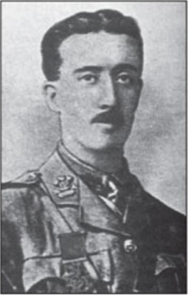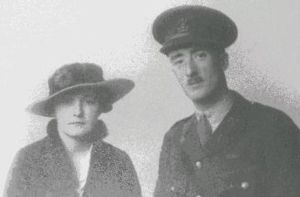View entry
Name: HOLLAND, John Vincent VC (Capt.)


Birth Date: 19 July 1889 Athy, Co. Kildare
Death Date: 27 Feb 1975 Hobart, Tasmania
First Date: 1930
Area: Naivasha
Married: In Queenstown, Clonmel, Cork 15 Jan 1917 Frances Grogan b. 19 July 1872 Ireland, d. 11 May 1960 Hobart, Tasmania
Children: Niall Vincent (1919-1944 Burma, on active service); Norman Joseph (10 Jan 1922 Conway, Wales-2017)
Book Reference: Red 31, Hut
War Service: Prince of Wales' Leinster Regt.
General Information:
Hut has Capt. J.D. Holland 1928 Naivasha
Gazette 18 June 1928 Capt. J.V. Holland, Naivasha District - Kenya Defence Force
Wikipedia:Holland was born into a middle-class family in Athy, County Kildare, the son of veterinary surgeon John Holland and Catherine Peppard. He was educated first at Clongowes Wood College and later at Liverpool University, and was one of 600 Old Clongovians to enlist in the army during World War One. On the outbreak of war he enlisted in the 2nd Life Guards Life Guards in November 1914 undergoing his training in Cumbermere Barracks Windsor. After a short time with the Life Guards he was granted a commission with the 3rd Battalion of the Leinster Regiment.[3] In March 1915 he was attached to the 2nd Battalion of the Royal Dublin Fusiliers and was then wounded in August and returned to England and Ireland to convalesce, but it wasn't long until he was back in France and back with the 7th Battalion Leinster Regiment serving as battalion bombing officer.
On 3 September 1916, during the Somme Offensive, whilst engaged in intense combat in the vicinity of the village of Guillemont, Holland was awarded the Victoria Cross for the following action:
"During a heavy engagement, Lt. Holland, not content with bombing hostile dug-outs, fearlessly led his troops through our own artillery barrage and cleared a great part of the village in front. He started out with 26 troops and finished with only five after capturing some 50 prisoners. By this gallant action he undoubtedly broke the spirit of the enemy and saved many casualties."
Holland was subsequently promoted to Captain. During the war he was also Mentioned in Dispatches and received a personal "Hickie Parchment" from his Divisional General-Officer-Commanding, Major-General William Hickie, in recognition of his bravery in action.
In 1917, Holland married Frances Grogan at the cathedral in Cork City. Together they had two sons: Major Niall V. Holland (d. 1944), who was killed in Burma during the Second World War and Norman J. Holland.
He was seconded for service with the Indian Army in the rank of Lt. 31st Oct. 1919. On the 13th Nov. 1919 he was appointed on probation to the Indian Army as a Captain, an appointment that was confirmed on the 27th November 1920. In September 1922 he retired from the army. At the outbreak of the Second World War, Holland again commissioned, serving as administrative officer of the 79th (Hertfordshire Yeomanry) Heavy Anti-Aircraft Regiment, Royal Artillery, then re-joined the Indian Army but was invalided out in 1941. He then took up a position with the Ministry of Food. In 1956, Holland and his wife emigrated to Hobart, in Tasmania. Holland died in Hobart in February 1975 at the age of 86. His body was buried in Cornelian Bay Cemetery, with military honours. His wife, Frances, pre-deceased him, dying in 1960. Holland lived to see the birth of his great-grandchild. On 3 September 2009 a memorial plaque was unveiled at Guillemont Church in France dedicated to the memory of the three soldiers who won Victoria Crosses in the fighting at the village during the Somme in 1916, Holland's name being one of the three.
On 3 September 1916, during the Somme Offensive, whilst engaged in intense combat in the vicinity of the village of Guillemont, Holland was awarded the Victoria Cross for the following action:
"During a heavy engagement, Lt. Holland, not content with bombing hostile dug-outs, fearlessly led his troops through our own artillery barrage and cleared a great part of the village in front. He started out with 26 troops and finished with only five after capturing some 50 prisoners. By this gallant action he undoubtedly broke the spirit of the enemy and saved many casualties."
Holland was subsequently promoted to Captain. During the war he was also Mentioned in Dispatches and received a personal "Hickie Parchment" from his Divisional General-Officer-Commanding, Major-General William Hickie, in recognition of his bravery in action.
In 1917, Holland married Frances Grogan at the cathedral in Cork City. Together they had two sons: Major Niall V. Holland (d. 1944), who was killed in Burma during the Second World War and Norman J. Holland.
He was seconded for service with the Indian Army in the rank of Lt. 31st Oct. 1919. On the 13th Nov. 1919 he was appointed on probation to the Indian Army as a Captain, an appointment that was confirmed on the 27th November 1920. In September 1922 he retired from the army. At the outbreak of the Second World War, Holland again commissioned, serving as administrative officer of the 79th (Hertfordshire Yeomanry) Heavy Anti-Aircraft Regiment, Royal Artillery, then re-joined the Indian Army but was invalided out in 1941. He then took up a position with the Ministry of Food. In 1956, Holland and his wife emigrated to Hobart, in Tasmania. Holland died in Hobart in February 1975 at the age of 86. His body was buried in Cornelian Bay Cemetery, with military honours. His wife, Frances, pre-deceased him, dying in 1960. Holland lived to see the birth of his great-grandchild. On 3 September 2009 a memorial plaque was unveiled at Guillemont Church in France dedicated to the memory of the three soldiers who won Victoria Crosses in the fighting at the village during the Somme in 1916, Holland's name being one of the three.
He served for a period in Kenya.
